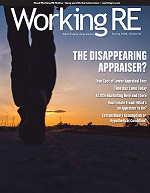 |
> How to Support and Prove Your Adjustments (7 Hours CE) (Highest Rating!) |
Real Estate Fraud: What’s an Appraiser to Do?
By Isaac Peck, Editor
Real estate and mortgage fraud is nothing new. Leading up to the real estate market crash of 2007— 2008, there seemed to be no end to the fraudulent schemes that were concocted. Appraisers saw it all: artificially inflated home prices, strawman schemes, stated income loans, equity skimming, and the list goes on. Some real estate and mortgage professionals brazenly committed fraud, many looked the other way, and a select few actively reported it and blew their whistles.
Several years and thousands of pages of regulations later, things have quieted down a bit. However, some appraisers are now reporting an uptick in the number of suspicious and fraudulent transactions in their markets.
Robert Johnson (speaking under an alias to avoid retaliation), an appraiser in Mass., says that he is seeing an increasing number of “cash back” deals in his market, where buyers and sellers are entering into side-agreements to artificially drive up the sales price (and value) of properties.
Cash Back
The “cash back” scenario/scam is increasingly common, according to Johnson, who says that his suspicions have been supported by several real estate agents/ brokers whom he’s spoken to in the area. “The buyer will agree to buy a house from the seller for $350,000 then get $50,000 back from the seller under the table after the deal closes,” says Johnson.
Johnson says he is also seeing it occur seemingly out in the open when the cash is transferred upfront as a gift. “I recently appraised a property where the long-term tenant was purchasing a property for $460,000, but was using a $50,000 gift he had been given by the seller as part of his down payment. It was absolutely preposterous. It raises a huge red flag for me whenever cash is passing between the seller and the buyer before, during, or after closing. It is a signal that something is not right,” reports Johnson.
The end result of such arrangements is that the bank is left with a mortgage that has a loan-to-value ratio of 95 to 100 percent (or more), and the buyer has effectively purchased a property with no money down.
In the most extreme versions of this fraudulent scheme, which is far from new, properties are sold for hundreds of thousands of dollars above market value (the appraiser is typically involved in the fraud), and the buyer sometimes immediately defaults, allowing the buyer and seller to walk (or run) away from the deal with hundreds of thousands in cash, at the expense of the bank. In many cases, the borrower’s motivation is less sinister. The borrower may simply lack the funds for the down payment, borrow money off the books, and plan to pay off the side-loan after receiving the cash back after closing.
The scam is part greed, part lack of knowledge, and part culture, according to Johnson. “I’ve asked some buyers point blank after a closing: ‘So how much money did you get back?’ Some are very upfront with me and admit to it. They don’t even know they’re doing anything wrong! In some cases it can be a cultural thing too. I know that in some cultures when you do a deal it is customary to give some money back to the buyer. It is a gesture of respect. Of course, in many cases the parties involved know they are breaking the law and are motivated by greed,” reports Johnson.
(story continues below)

(story continues)
Appraiser Independence
These schemes place honest appraisers in the position of deal killer. “Most of these deals, whether they are gifts or just under the table agreements, only work if the appraiser comes in at the contract price, which is typically inflated significantly above market value,” says Johnson. This scenario creates incredible pressure on the appraiser to look the other way and basically grease the wheels of the fraud.
These types of deals are increasingly originating from up-and-coming mortgage brokers who are working through AMCs, according to Johnson. “The AMCs are typically getting so much work from the mortgage broker that they are eager to push value to make the client happy. I’ve had very aggressive AMC personnel call and lecture me on how the value of a property is what a willing and able buyer will pay a willing and able seller today. They try to accuse me of doing a bad job,” says Johnson.
The result of doing honest, unbiased appraisals has not only put incredible pressure on Johnson, but also cost him clients. “I had a recent order where I came in $40,000 below the contract price. The value clearly wasn’t supported, yet everyone went berserk. That was the last order I got from that AMC. They essentially told me that I don’t know what I’m doing and I must’ve missed something. They suggested that if I want to keep the business, I had better redo the appraisal. I refused,” says Johnson.
This is just the sort of pressure that the Home Valuation Code of Conduct (HVCC) was intended to prevent— by removing direct contact between mortgage brokers/order originators and appraisers. AMCs are supposed to be the firewall that keeps things honest but it appears to not be working in all cases.
Part of the problem, according to Johnson, is that there is no accountability for the people making the loan. “Whoever they sell the loan to is going to be into the house for 100 percent or more of the value. That loan is going to get securitized and sold to other banks or Fannie Mae. Anyone who is selling the paper is trying to bump the value as high as they can. If they actually cared, they would be happy when I tell them the house isn’t worth that. But they aren’t, and it clearly reveals their motivations,” says Johnson.
(story continues below)
(story continues)
What Appraisers Can Do
According to Richard Hagar, SRA, fraud expert, consultant and educator (see Adjustments pg. 3), mortgage fraud is still happening at the same or higher rate than it was during the real estate boom. Hagar advises appraisers to stand firm and resist yielding to value pressure, especially when the deal smells fraudulent. “Real estate and mortgage fraud scams only succeed when they find a ‘compliant’ or ignorant appraiser. These AMCs and corrupt lenders test appraisers for complacency by offering super low fees. They figure if the appraiser is desperate enough to accept a low fee they will likely cut corners and skip analyzing the purchase and sale agreement altogether,” says Hagar.
Of course, fraud is often difficult to spot. In some cases, the appraiser may not even realize there is fraud going on in the background, but will simply note that the contract price seems unusually high. Pointing to Fannie Mae’s Selling Guide, Hagar notes that the lender is responsible for delivering to the appraiser “a copy of the complete, ratified sales contract and all addenda for the property that is to be appraised.” Hagar says it’s important for appraisers to be detectives in this regard. “Appraisers must request the purchase contract in its entirety and every page of addenda directly from the lender. The lender is required to give you a copy of the full contract with everything included,” advises Hagar. “Once you’ve done your detective work, you must disclose, disclose, disclose. Any gifts, funny business, or other concessions must be fully disclosed in your report.”
In terms of gifts, Hagar says that appraisers should also be on the lookout for gifts from non-profit entities, as this could be an indicator of fraud. Fannie Mae prohibits “Interested Party Contributions” (IPCs) from being used to “make the borrower’s down payment, meet financial reserve requirements, or meet minimum borrower contribution requirements.” Fannie’s requirements also prohibit funds from flowing “from an interested party through a third-party organization, including nonprofit entities, to the borrower.”
Because these scams can be difficult to spot, the best defense an appraiser has is to do good appraisal work. “My advice is to appraise honestly and be smart. Appraisers must look to the market and make appropriate supported adjustments in the appraisal. If appraisers are paying attention to the market and making supported adjustments, they will not only be more likely to spot fraudulent transactions, but they’ll have a defensible report if anyone ever comes asking,” says Hagar.
Let Sentence Fit the Crime
As a consultant who works with law enforcement on fraud cases, Hagar sees firsthand what can happen to appraisers who succumb to influence. “Right now I am working with a government agency in the Midwest with this exact scenario. There were overt attempts to influence the appraiser and the appraiser went along with it. He wasn’t in on the deal, he didn’t receive anything; they just pressured him to meet value, and he did. The FBI is trying to decide if they want to indict the appraiser or not,” reports Hagar.
The penalties for such behavior can be stiff, which is why Hagar says it’s important for appraisers to sound the alarm when they suspect a deal of being fraudulent. “An appraiser can still be charged as a co-conspirator even if they are not in on the deal. If the appraiser I am investigating had spoken up and reported the incident, or refused to meet value, it wouldn’t be a problem. If he had reported the transaction to his bank’s compliance officer or the FBI, he wouldn’t be considered a co-conspirator. The problem is the appraiser did not report this, and then did it another 15 times,” says Hagar. “Even if the FBI doesn’t pursue him, the bank will go after the appraiser. So he is sure to be sued, even if he isn’t indicted.”
The moral of the story is that if you do smell fraud or a deal looks funny, you should contact the bank’s compliance officer as well as the FBI, Hagar says.
Clients and Reporting
In terms of the pressure that appraisers experience and the violation of appraisal independence, Hagar says that, in many cases, appraisers have to choose their integrity over a pushy client. “Appraisers should try to explain their position and stand firm on quality work when push comes to shove. If after careful explanation and reasoned argument, your client still does not see the light, perhaps it is time to move on,” says Hagar.
Appraisers can and should report violations of appraiser independence and potential real estate fraud to their state appraisal boards, the Department of Financial Institutions, the Consumer Financial Protection Bureau (CFPB), the Office of the Comptroller of the Currency (OCC), the Compliance Officer at the lender in question, and the FBI. “Your appraisal board, the CFPB, and the OCC will not be instantly responsive. It typically takes these organizations a long time to respond. That’s why if appraisers suspect there is fraud involved, they should file a complaint with their local FBI office. Appraisers can also file suspicious activity reports (SARs) with the Financial Crimes Enforcement Network (FinCEN). Lastly, appraisers should definitely notify the Compliance Officer at the lender. The bank might thank you for the heads-up. This is serious stuff. Even if you lose a client, that’s preferable to being indicted as a co-conspirator,” advises Hagar.
Valuable CE Offered Online – 7 Hours
How To Support and Prove Your Adjustments
Presented by: Richard Hagar, SRA
Do you have the proper support for your adjustments? Stop taking the same old CE courses and learn proven adjustment methods with instructor Richard Hagar, SRA. Fannie Mae states that the number one reason appraisals are flagged is the “use of adjustments that do not reflect market reaction.” Stay out of trouble with Fannie Mae, your state board and your AMC/lender clients with solid, supportable adjustments. Up your game, avoid time-consuming callbacks and earn approved CE today!
“Why wasn’t this taught years ago?” – Jackie Henry
How to Support and Prove Your Adjustments
Sign Up Now! $119 – 7 Hrs. Approved CE
(OREP Member Price: $99)
About the Author
Isaac Peck is the Editor of Working RE magazine and the Director of Marketing at OREP.org, a leading provider of E&O insurance for appraisers, inspectors and other real estate professionals in 49 states. He received his master’s degree in Accounting at San Diego State University. He can be contacted at Isaac@orep.org or (888) 347-5273.
Send your story submission/idea to the Editor: isaac@orep.org




by Rachel Massey
Good article Isaac! I think this is important to publish, and publish again and again (even if it is just a variation on the theme). We do seem to be going back to the days of 2000-2005, where markets went up, up, up. We are seeing 0% down payment loans again, as well as seller’s sweetening the deal. I am glad to see this published. Keep up the good work!
-by Thomas Rich
Quicken Loans has 3% down program and Quicken gives grant to borrower of 2% of contract price. Assume this should be disclosed by appraiser. Program is approved by Freddie Mac. What could the logic be for this program other than to get a loan?
-by Edd Gillespie
I’m grateful that the warning and advice is coming before the residential real estate market completes its collapse. Thanks.
I am sorry for those of you who still are in a position to take what comes and cannot chose your clients. Until appraisers take back their trade and their businesses we remain impotent.
Richard and Isaac both give us good advice, but what is amazing is that the appraiser organizations all of whom insist at least on honesty, transparency, competency and trustworthiness as required appraiser character traits and working principles have done absolutely nothing to build a shield for appraisers caught up in fraudulent real estate schemes.
Basically, when it comes to business and possibly your chosen career as an appraiser we are each on our own and unfortunately if you blow the whistle most likely you loose work.
Thanks for watching, reporting and warning guys, but it is unfortunate the course of action advised is one that appraisers are ill equipped to pursue. We individually simply do not have the resources or support to do be ultimately virtuous and refuse the work.
What a missed opportunity to interrupt an arrangement that is so easily abused. And we, as appraisers learned long ago to join the team and make a decent wage or be a straight arrow and get little.
We can do the right thing and blow the whistle, but remember most of us are not trained to detect and report fraud. And, as Richard eludes, there isn’t much of anyone to report to who will respond and none who will protect you and your business. We seem to have accepted the roll of unpaid cops investigating the financial industry.
Bottom line, you are on your own if you do the right thing.
-by VIRGINIA APPRAISER
I just experienced the same thing last week. It smelled right from the beginning after reading the sales agreement. It smelled even more after viewing the subject property. I blew it out of the water with an honest appraisal. I believe this more wide spread than what we think, again.
-by Mary Thompson
Yet another reason to pursue NON lender business! I am not surprised by this. I was also told recently that a fairly large Bank in our area is still holding onto a large backlog of Foreclosures because it will look bad for the Books if they release them. So they are doing it slowly, very slowly. So be prepared for another crash folks because I am quite sure this is happening with all major banks out there. GREED is very short sighted. It is all about the money and once again, The Appraiser is the fall guy and expected to “Be the Detective” looking for something that will most likely be covered up or left out of any sales contract or addendum to the contract.
-